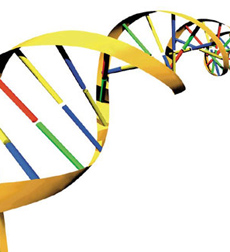fitness news
![]() ,
,![]()
Font size Weight Management
Unraveling the Obesity Gene
– Reported, April 09 2012
 (Ivanhoe Newswire) — It is rapidly becoming the number one health problem in the U.S. and it is now the most common chronic illness in childhood. Obesity is a complex and potentially devastating condition, particularly if its onset is in early childhood. There are significant environmental and behavioral factors involved in the causes of obesity but some of us may carry it in our genes!
(Ivanhoe Newswire) — It is rapidly becoming the number one health problem in the U.S. and it is now the most common chronic illness in childhood. Obesity is a complex and potentially devastating condition, particularly if its onset is in early childhood. There are significant environmental and behavioral factors involved in the causes of obesity but some of us may carry it in our genes!
In the most recent National Health and Nutrition Examination Survey (NHNES) with data collected from 1999 to 2000, the prevalence of obesity was 10% among children 2 to 5 years of age and 15% among children 6 to 19 years of age. Now, Prader-Willi syndrome (PWS) is the best characterized and most frequent known genetic cause of life-threatening obesity in children.
“Prader-Willi syndrome (PWS) is a complex neurodevelopmental genetic condition,” Merlin Butler, MD, PhD, FFACMG, Director of Division of Research and Professor of Psychiatry and Behavioral Sciences and Pediatrics at Kansas University Medical Center, told Ivanhoe. “Its characterized by a range of mental and physical findings including obesity that can be life-threatening.”
With one in 12,000 to 15,000 people with PWS, Dr. Butler says PWS is considered one of the more common reasons to be seen for genetic services.
“It was the first syndrome to be reported due to an imprinting defect,” Dr. Butler said.
It first appeared in the medical literature when endocrinologists Prader, Labhart, and Willi published a report describing an unusual pattern of abnormalities. Among those abnormalities were diminished fetal activity, profound poor muscle tone, feeding problems in infancy, short stature and cognitive impairment. Dr. Butler says it develops in early childhood and he calls it the perfect storm.
“Their metabolism is decreased and that correlates with a decreased muscle mass, and decreased physical activity and muscle tone,” Dr. Butler said. “They also lack the ability to vomit.”
People with PWS appear to have a flaw in the hypothalamus part of their brain, which normally registers feelings of hunger and satiety. Compulsive eating and obsession with food usually begin before age 6.
“They have this food drive to eat, but they dont have the feedback from the stomach to the brain to stop eating,” Dr. Butler said.
According to the Prader-Willi Syndrome Association, PWS is due to lack of several genes on the long arm of one of an individuals chromosome 15s, normally contributed by the father. In the majority of cases the critical genes are somehow lost from the chromosome 15. In most of the remaining cases, the entire chromosome from the father is missing and there are instead two chromosome 15s from the mother.
“This tells us that the chromosome 15 behaves differently whether we receive the chromosome 15 from the mother or the father,” Dr. Butler said.
He says early diagnosis of PWS is possible in the first weeks of life because of better awareness and genetic testing, which could save lives.
“Early diagnosis is important,” Dr. Butler told Ivanhoe. “Growth hormones are important for quality of life.”
Although it doesnt fix the problem or cure it, growth hormones can aid in growth and development.
“They are able to burn more calories and be stronger, and it has helped decrease obesity and heart disease and diabetes,” Dr. Butler said.
New research is underway and Dr. Butler says the goal is to activate the inactive genes that cause the syndrome on the mothers chromosome 15 without activating bad or unhealthy genes in the process.
“How do you turn those genes on? We are working on that,” Dr. Butler said.
If you want more information on PWS, you can visit www.pwsausa.org
SOURCE: Prader-Willi Syndrome Association, Ivanhoe Broadcast News Interview with Merlin Butler, MD, PhD, FFACMG, Director of Division of Research and Professor of Psychiatry and Behavioral Sciences and Pediatrics at Kansas University Medical Center